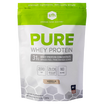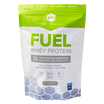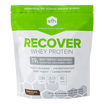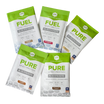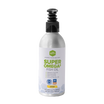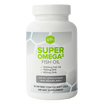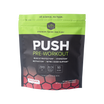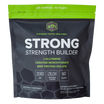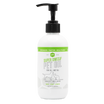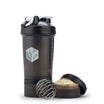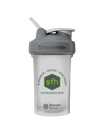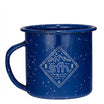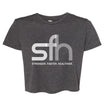What Is Bioavailability…
And Why Does It Matter?
The nutrition facts label is probably one of the very first things you’re looking at when you’re buying protein supplements. But before you choose the bottle with the highest grams of protein per serving, wait just a second – there’s more than just the quantity present in each scoop that you need to consider! There’s also another important question you need to ask: How much of this nutrient can my body actually use?
Let’s talk about bioavailability – what it is, why it matters, and how you can find the most bioavailable supplements to get the most bang for your buck.
What is Bioavailability?
A nutrient’s “bioavailability” describes the rate and total percentage of the initial amount of that nutrient that reaches its intended biological destination.
Yes, that might sound like a technical mouthful, but the concept is actually pretty simple: every time you eat something, use a nutrition supplement, or take a prescription drug, you’re taking in a certain amount of nutrients or active components, and you want your body to use that serving for health and wellness benefits. But depending on a variety of factors, like how well your body can digest the source, your body may not be able to absorb the entirety of the initial serving. Your body will be able to use more of that amount for its intended benefits in supplements with high bioavailability, and less for supplements with lower bioavailability.
To put it in simpler terms, the bioavailability of a substance determines how much of it your body is actually able to use!
Why does bioavailability matter?
When something has a low bioavailability, it means that you aren’t able to absorb as much of its active component as you would probably like to. So ultimately, you’re reaping fewer benefits from taking a supplement with low bioavailability than you would with a supplement with higher bioavailability.
One key example that shows just how much bioavailability matters is when you take a look at protein supplements. Protein is a nonnegotiable for many athletes and fitness enthusiasts: it helps your muscles recover and rebuild after a workout, which ultimately helps them grow bigger, stronger, and better trained. But not all protein sources are equally bioavailable, which means that you may not be getting the same biological benefits between different foods and supplements even if the grams of protein present are the same.
Incomplete vs. complete protein sources
Another thing to consider is the kind of protein that you’re getting from your protein sources.
On a chemical level, protein molecules are made up of long chains of amino acids, some of which your body can’t make on its own. So you need to get these kinds of amino acids (called “essential” amino acids) from your diet to form complete protein molecules.
Based on the kinds of amino acids present, there are two different kinds of protein you can get from food and supplements:
- Complete protein sources, which contain all the essential amino acids your body needs and can therefore be consumed alone
- Incomplete protein sources, which don’t contain all the essential amino acids you need and therefore need to be combined with other sources to create full protein molecules
Generally, complete protein sources are ideal since your body can use them immediately to help build and repair muscle, unlike incomplete protein sources.
The Most Bioavailable Sources of Protein
Some of the most bioavailable protein sources for working out and eating well:

Whey Protein
Whey is the gold standard of protein powders for a reason! Whey protein concentrate, which is the liquid portion of cow milk, is the purest form of protein you can take in. High-quality whey protein is also really fast and easy to digest, making it the most bioavailable protein source around.
But unfortunately, not all wheys are created equal. Some supplement companies use whey protein isolate, which has had its natural BCAAs filtered out and then added back in during the processing. What’s worse, some supplement companies may try to make up for their low bioavailability by adding in substances like digestive enzymes or sketchy proprietary enzyme blends since their supplements are so hard to digest on their own. But these unnecessary additives can also lead to bloating, pain, and/or gas.
But with high-quality whey protein powders like SFH’s PURE, FUEL, and RECOVER options, none of those additives are necessary. Our whey protein concentrate is made with milk from grass-fed cows and is processed with advanced cold-filtering and flash pasteurization that leaves essential BCAAs intact. This means that our protein is both organically bioavailable and easy on your gut!

Eggs
Eggs are another excellent and convenient way to get protein either before or after your workout, with each egg providing roughly 6 grams of complete protein. If you’re looking to cut down on the calories, you can eat the egg whites alone and still get a ton of protein with less dietary fat.

Red Meat
Red meat (think beef and pork) is also a great source of complete protein. These sources are a little slower to absorb and digest than some other sources because they also come with a fair amount of fat, so you might consider adding them to your post-workout rather than your pre-workout meal.
Conclusion
Your supplement’s bioavailability can determine just how useful they are in your quest for better health and wellness. When shopping for protein supplements, make sure you’re going for the highest-quality products available so that you can reap the most health and fitness benefits with each shake.
Meet the Author

Erica Digap is a science-minded copywriter specializing in evidence-based nutrition science, fitness, and health content. After receiving her Bachelor of Science in Clinical Nutrition from the University of California, Davis, and working as a consultant and director in the corporate diet industry for many years, she decided to set forth and use her experience and expertise to inspire readers to make lasting, healthy lifestyle changes – one nutritious meal and workout at a time.
Linkedin / Website


